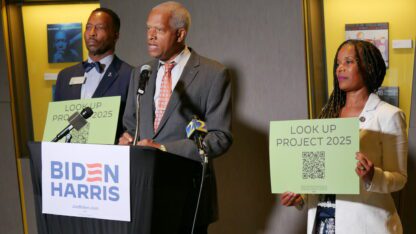This coverage is made possible through a partnership between WABE and Grist, a nonprofit environmental media organization.
A group of Georgia energy and voting rights advocates is calling for delayed Public Service Commission elections to happen as soon as possible. The group is suing to challenge a state election law passed earlier this year.
PSC elections in Georgia have been on hold since 2022 because of a federal lawsuit alleging the election process for commissioners violates the Voting Rights Act. The U.S. Supreme Court recently declined to take that case, meaning the system will stay in place as-is, and clearing the way for elections to proceed.
But that won’t happen immediately.
Under the new state law, elections for two seats on the commission would resume in 2025, with the remaining three seats following on a staggered schedule. Most of the current commissioners would end up serving at least two years beyond their regular six-year terms.
Plaintiff Brionté McCorkle of Georgia Conservation Voters called the law “undemocratic.”
“People deserve fair representation and meaningful inclusion in the decisions that are impacting their lives,” she said at a news conference announcing the new suit. “This power grab in postponing elections is not what democracy is supposed to look like.”
The advocates said they’d like to see elections as early as this fall. Their attorney acknowledged the exact timeline would depend on the courts.
The Secretary of State’s Office declined to comment.
The original lawsuit took issue with Georgia’s system for electing public service commissioners, who have to live in specific districts but are elected by statewide vote. McCorkle and three other Black voters in Atlanta argued this diluted their votes, preventing them from electing the representative of their choice to the commission.
A federal judge agreed and blocked the elections from proceeding until a new system could be devised; the 11th U.S. Circuit Court of Appeals later reversed that ruling and lifted the injunction.
In the meantime, two commissioners whose elections were canceled in 2022 have continued to vote on issues including a rate hike to pay for new nuclear reactors, another charge to pay for soaring natural gas prices and a deal that will allow Georgia Power to construct new gas turbines.
A third commissioner’s term is due to expire at the end of this year, with no election scheduled until 2027 under the new law.









